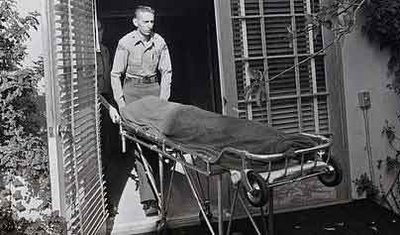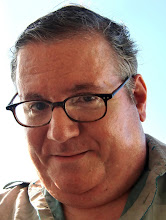The Death of Marilyn Monroe & My Letter To Playboy

On August 5, 2005, the Los Angeles Times printed a major article on the anniversary of Monroe's death in which former assistant District Attorney John Miner claimed to have transcripts he made of tapes which Monroe made with her psychiatrist before her death.
Marilyn's Secret Tapes
Former prosecutor says he has heard tapes that Marilyn Monroe made in the days before she died that prove the actress was anything but suicidal.
"But there is bitterness and frustration as well for the former Los Angeles County prosecutor, who was at her autopsy and was one of those looking into her death. He didn't believe that the actress took her life in '62 and he doesn't believe it now, and Miner says he's heard secret tapes that Monroe made in the days before she died that prove the actress was anything but suicidal.
As head of the D.A.'s medical-legal section when Monroe died, Miner had met with the actress' psychiatrist, Dr. Ralph Greenson. During the interview, Miner says, Greenson played the Monroe tapes, but only on condition that the investigator never reveal their contents."
In December 2005, Playboy featured an article, "The Strange, Still Mysterious Death of Marilyn Monroe" and printed Miner's transcripts.
The article was the usual mish-mash of long discredited rumors and speculation with some new "revelations" taken from a new book by one of Joe DiMaggio's relatives who claims she was Monroe's confidante.
I wrote a long letter responsding to Playboy's article and emailed it to them. They edited and rewrote my letter but printed it in their current issue (March 2006).
Here is the undedited text of my letter:
Dear Playboy:
After over forty years of articles, books and documentaries, there is still no credible evidence that Marilyn Monroe had an affair with Robert Kennedy, that he was at her home on the day that she died or that she was murdered. L.A. Confidential author James Ellroy told the Richmond Review, "I used to be friends with Shakedown Freddy Otash, private eye to the stars in LA circa 1955 to 1965. Freddy told me he is convinced that Bobby never had an affair with Marilyn Monroe that, at the time of Marilyn's death, Bobby was interceding on Jack's behalf, trying to get this crazy woman to quit calling the president of the United States at the White House. She just kicked off coincidentally." Monroe even told her masseur and confidante Ralph Roberts, “It's not true. I like him, but not physically.”
Robert and Ethel Kennedy flew to San Francisco on August 3, 1962 and spent the entire weekend in the company of Kennedy’s friend John Bates, Bates’ wife and their family at their Gilroy, California ranch. FBI records and statements from Bates, his family and workers on Bates’ ranch demonstrate that it was impossible for Kennedy to have visited Monroe’s home on August 4, 1962. Long before a drug-addled Peter Lawford began telling far fetched tales about his role as some sort of Kennedy bagman, he confirmed that RFK spent the weekend in northern California. Columnist James Bacon said, “I talked to Lawford right after she died, and he said Bobby was up north, some guy's farm up there, yes.”
No matter what he told others later on, Peter Lawford didn’t go to Monroe’s home after she died to retrieve her red diary (which was actually merely an address book). Peter Lawford called Monroe on August 4 at 7:40 or 7:45 p.m. Monroe’s trademark breathy voice was slurred and nearly inaudible. She said, "Say goodbye to Pat, say goodbye to the president and say goodbye to yourself because you're a nice guy." Lawford called back but the line was busy. An agitated Lawford called his manager, Milt Ebbins. Ebbins told him not to go to Monroe’s house because it would seem improper. Ebbins told Lawford, "You're the president's brother-in-law." Lawford's maid and his friend George Durgom said Lawford never left his house that night. As author Mel Ayton writes, “In the final few years of his life, Lawford was dependent on drink and drugs and was altogether destitute. Perhaps he saw the embellishments to his story as a way of resurrecting his failing career. On his deathbed on Christmas Eve 1984, Lawford told a Los Angeles Times reporter: ‘Even if these things were true (Monroe's relationship with the Kennedys) I wouldn't talk about them. That's just the way I am.’”
What happened to Monroe is clear. Milton Rudin, Monroe’s attorney, received a call from Dr. Ralph Greenson well before midnight telling him Monroe was dead. When Rudin arrived at Monroe’s home, he encountered Greenson and Eunice Murray. Greenson told Rudin, "God Damn it he (Engleberg) gave her a prescription I didn't know about (Dr. Hyman Engleberg was Monroe’s primary physician)." In fact, Monroe had a fresh prescription for Nembutal prescribed by Dr. Engleberg filled days before she died.
John Miner’s rationale for coming forward with his notes of Greenson’s tapes doesn’t withstand scrutiny. If Miner hopes his notes will stimulate a new investigation into Monroe’s death, then it was incumbent on him to tell the appropriate authorities about them right after Monroe died. When the Los Angeles District Attorney reexamined the case in 1982, Miner mentioned the tapes but never said he had taken any notes. Greenson’s widow, Hildegard, recently told the Los Angeles Times that she never heard her husband discuss any tapes. In your article, Lisa DePaulo asks, “Who could make this up?” Anyone with a little bit of imagination could wade through some of the books, articles and documentaries on Monroe and cobble together Miner’s transcripts. Over the years, numerous people have come forward claiming they have fantastic new revelations about Marilyn Monroe. They invariably turn out to be people with a tenuous or nonexistent connection to Monroe who want to become at least a footnote to her legend or are trying to cash in on her late in their lives. Miner is no exception.
John Miner was looking for a paying publisher for his notes ten years ago. Dan Abrams interviewed Miner and Marilyn Monroe biographer Anthony Summers on his MSNBC TV show on August 8.
Summers told Abrams, “He (Miner) first brought to me and thus to Vanity Fair magazine, to which I contribute sometimes, his so-called transcript back in 1995, before he said he had shown it to anyone else. And Vanity Fair and I decided it wasn’t worthy of being published and I haven’t changed my mind.
What happened in 1995 was that Miner got in touch to say he was going to let go what he claimed to have heard Monroe say on the purported tapes. He said he had 70 to 80 handwritten pages of what he called manuscript type notes of what he supposedly heard back in 1962. He obviously wanted money. I mean, it was evident that he wanted money were everything to be published. Some of it, perhaps he said to found a scholarship in memory of Monroe's psychiatrist, that’s Greenson, but also for himself and he spoke of having been offered six-figure sums for his story.
I asked him how he could possibly recall 80 pages worth of what Monroe had said more than 30 years earlier. And he said, as I think he said just now, that he had made notes full of a sort of shorthand back in 1962.
He claimed he’d got an extraordinarily good memory. He later said he had located those notes in a storage shed. But in spite of months of urging, he never produced them and he did produce not 70 to 80 pages, but a 35-page narrative written on a yellow legal pad. But he admitted that he had written that up only in the very last few weeks.
Vanity Fair and I said thanks, but no thanks. I don’t understand why any reputable paper like The New York Times, like the L.A. Times would decide to run the material.”
The various murder scenarios that writers have offered molest plausibility. Two men entered Monroe’s home forcibly without alerting her or housekeeper Eunice Murray, subdued Murray and Monroe and administered a fatal enema to Monroe? It would have been nearly impossible for Monroe not to have received bruises or abrasions to her skin if she resisted even momentarily. Yet none were discovered during her autopsy.
James Bacon visited Monroe five days before her death. “She was drinking champagne and straight vodka and occasionally popping a pill. I said, ‘Marilyn, the combination of pills and alcohol will kill you.’ And she said, ‘It hasn’t killed me yet.’ Then she took another drink and popped another pill.”
The last words should fittingly belong to Monroe’s first husband, James Dougherty, an LAPD detective for 25 years. He told Larry King, “I think we know the whole story.” Dougherty told King that he received a call from policeman Jack Clemmons. “He was at the scene and called me, told me that Marilyn had passed away from possibly an overdose of sleeping pills. He didn't say there was any evidence of murder. He just said it looked like an apparent accidental overdose. I think that she died of an accidental overdose of narcotics and I don't think anybody killed her or I don't think her doctor was there breaking her rib, putting a needle in it. I think these are all fabrications of people's imagination, and it's unfortunate, because she had people there before when she took overdoses, and someone was there to take care of her. So, there was no one there this time and she passed away.”

